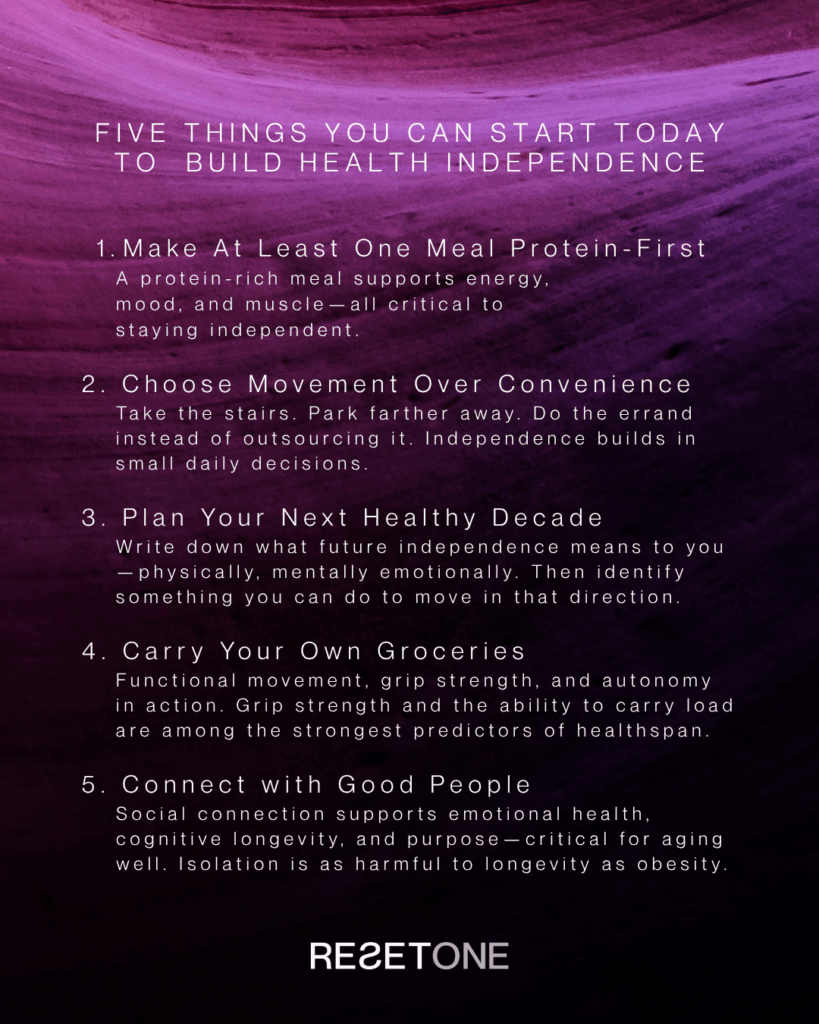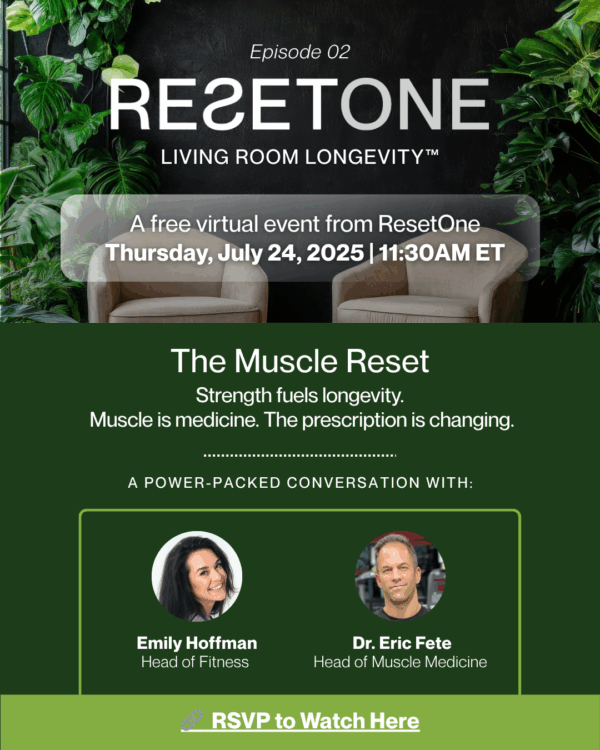- The Hidden Cost of Lost Independence
- Health Freedom Isn’t a Given. It’s Built.
- The Longevity Shift: From Reactive to Proactive
- The 3 Pillars of Health Independence
- Independence is more than freedom: it’s a vital sign.
- Watch the Replay of our Living Room Longevity: Muscle Reset Session
▶ Listen to this post.
This Independence Day, let’s talk about a different kind of freedom.
Not political. Not symbolic. But personal. Physical. Cognitive. The kind of independence that lets you move through the world with strength, energy, and clarity.
Because the truth is, longevity isn’t just about how long you live.
It’s about how long you can live well.

The Hidden Cost of Lost Independence
Most people think of aging in terms of wrinkles, birthdays, or blood pressure. But in longevity medicine, one of the clearest markers of healthy aging is something far more personal: your ability to live independently.
Can you get up without help?
Make decisions with ease?
Stay sharp, active, mobile, and confident?
When those things slip, everything else starts to unravel. And it often happens silently, years before a diagnosis shows up on paper.
And science backs this up strongly.
In a large meta-analysis of nearly 2 million adults, researchers found that lower grip strength was associated with a 69% higher risk of death. Even leg strength, as measured by knee extension, predicted outcomes more reliably than many common lab values. These simple, functional indicators consistently outperformed blood pressure and cholesterol when it came to predicting mortality.
Another study followed over 3,000 older adults for more than a decade. Those with greater muscle mass had significantly lower all-cause mortality, even after adjusting for age, lifestyle, and comorbidities.
In other words: more muscle = more life.
And it’s not just about muscle.
Walking speed has also emerged as a powerful biomarker of aging. A slower gait is linked with higher risk of cognitive decline, falls, hospitalization, and early death. Even small drops in walking pace are often the earliest sign that something in the body or brain is starting to shift.
None of these indicators require high-tech equipment or invasive tests. But they do require awareness. And action.
Health Freedom Isn’t a Given. It’s Built.
At ResetOne, we believe that your independence, your strength, focus, and vitality are worth protecting.
That means:
- Tracking biomarkers to catch subtle declines early
- Personalizing hormone, fitness, nutrition, and sleep protocols to match your biology
- Using advanced therapeutics like peptides, mitochondrial support, and hormone optimization when needed
- Supporting muscle, bone, and cognitive health before they become fragile
Why is this so important?
Because independence often starts to slip before you even notice it.
Age-related muscle loss, known as sarcopenia, can begin as early as your 30s and accelerates in your 50s and beyond. But here’s the key: it’s not just about shrinking muscle mass. Dynapenia, the loss of muscular strength, is even more predictive of disability and mortality, and it can occur without any visible changes in body composition.
Studies show that older adults with lower strength, not necessarily less muscle, are significantly more likely to experience falls, cognitive decline, and hospitalization. One national study found that low muscle strength was associated with a 50% higher risk of early death, independent of muscle mass or chronic conditions.
Cognitive decline follows a similar pattern. Executive function, the ability to plan, decide, and focus, often starts to subtly degrade long before it reaches a clinical threshold. But research suggests that lifestyle interventions like resistance training, targeted nutrition, social connection, and sleep optimization can slow this trajectory and even reverse some changes.
These shifts including loss of power, focus, resilience, don’t happen overnight. But they do happen quietly. Until one day, you notice that your body doesn’t respond like it used to. Or your confidence starts to shrink right alongside your stability.
The good news is that all of this is modifiable.
By shifting the focus from reactive sick care to proactive longevity medicine, you can rebuild strength, protect cognitive function, and extend your freedom, not just your years.
That’s health freedom. And it’s not just possible: it’s measurable, trainable, and within reach.

The Longevity Shift: From Reactive to Proactive
Traditional medicine kicks in when something breaks. But by then, you may have already lost ground: mobility, confidence, or quality of life. Longevity medicine flips that script. It gives you tools to stay ahead of the curve. To stay strong enough to carry your groceries, energized enough to travel spontaneously, and clear-minded enough to lead with purpose.
Even biological aging itself can now be measured and slowed using multi-biomarker panels, which are linked to everything from functional decline to mortality.
In other words: Independence and Healthspan go hand in hand.
The 3 Pillars of Health Independence
At ResetOne, we think about independence not as a single trait, but as a system, one supported by three interconnected pillars:
Strength
Your ability to move, lift, carry, and physically navigate the world.
This isn’t about aesthetics or gym performance, it’s about function. About getting up off the floor without help. About carrying your own groceries, walking confidently into a room, or picking up your grandchild without hesitation. Strength gives you access to life. And when it starts to fade, so does your autonomy.
Cognition
Your clarity of thought, memory, and decision-making.
We don’t just measure aging by how the body feels, but by how the brain works. Executive function, recall, and focus are key to living independently. They allow you to manage your health, your home, your relationships, and your identity. Cognitive decline isn’t always obvious at first, but the earlier you intervene, the more powerful the impact.
Connection
Your relationships, sense of purpose, and support network.
Loneliness is as dangerous to your health as smoking or obesity. But this pillar isn’t just about avoiding isolation, it’s about cultivating meaning. Purpose. Engagement. Humans are wired to thrive in connection, and staying socially and emotionally engaged can slow cognitive aging, improve immune function, and extend healthspan.
When even one of these pillars starts to weaken, the others often follow.
- A decline in strength can lead to social withdrawal.
- A dip in cognition can erode confidence and physical activity.
- A loss of connection can spiral into mental and physical disengagement.
That’s why longevity isn’t about targeting a single issue. It’s about protecting the whole system, so you don’t just live longer, but remain strong, sharp, and supported for years to come.
Independence is more than freedom: it’s a vital sign.
Ask yourself:
Are you free in your body?
Are you energized by your life—or exhausted by it?
Are you taking steps now to protect your future?’
What you do today shapes the freedom you’ll feel tomorrow.
If this sparked a shift in how you think about aging, health, or freedom, share this with someone you care about, and take one small step together.
Watch the Replay of our Living Room Longevity: Muscle Reset Session
In our pre-recordded Living Room Longevity Series, we dive into the science of staying strong through movement, recovery, peptides, and hormone support that’s built for real life, not just the gym. This free, virtual webinar is for muscles of all ages and sizes.

Long live longevity.™




